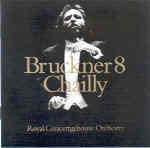With the exception of his recent tepid account of Bruckner’s Ninth Symphony, Riccardo Chailly’s slowly unfolding cycle of these monumental works has earned the conductor well-deserved kudos as a Brucknerian of the first rank. While his individual recordings of these symphonies do not always garner primus inter pares honors, his conceptions of scale, balances, and tempos overall are never less than satisfying. This release of the great Eighth Symphony (recorded in 1999) features the Concertgebouw Orchestra in all its usual splendor: great brass throughout, highly refined wind playing in all the sections, and rich and sonorous strings.
Chailly chooses traditional, spacious timings for all four movements, with the entire symphony clocking in at just over 79 minutes. The scherzo is notable for its flair in the phrasing of the first theme in the cellos and violas, whose forward momentum is immediately sparked by slightly increasing crescendos. Chailly is particularly attuned to inner voices (as he was in his 1985 rendition of the Seventh Symphony) to the extent that even the seventh and eighth horn parts become fascinating. Similarly, he coaxes near-perfect balances in the ensemble playing (the tenor tubas and marvelous oboe solo over barely audible string tremolos at measure 140 in the first movement, or the shimmering harp arpeggios in the third movement, for example).
What this performance ultimately lacks is a sense of drama or nervous intensity (never a strong point with Chailly anyway); and when placed alongside such vivid recordings by Maazel and the Berlin Philharmonic (EMI) or Böhm’s blazing 1978 live performance from Zurich (Palexa), Chailly’s reading comes across as somewhat low-voltage. The climaxes never really reach full force until the coda of the fourth movement, making you feel he’s reserved much of the symphony’s explosive energy until the very end. The first movement’s two towering climaxes, at the recapitulation and before the coda, lack the sort of brute impact that sits you upright, and nearly all the double-forte passages tend to sound a degree lower in dynamic amplitude (check out the first such instance in the third movement). As beautifully recorded and played as it is, the result is a reading that, while certainly recommendable to followers of this series, feels just a bit laid-back.
































